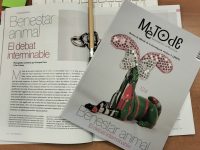|
Arturo Larena is an environmental journalist and has been working for the EFE news agency for over twenty years. He won the National Environment Award in 2005. He took part in the seminar «Science and the Press», co-organized by Mètode in the UIMP, where he explained how EFE Verde, where he is the director, contributes to science communication. Larena’s platform for environmental journalism manages to «generate environmental content almost everywhere in the world», according to the journalist. And although they try to adapt to the age of new technologies adding multimedia content to the platform, in EFE Verde they are still «loyal to the values of the best traditional journalism».
Let’s talk about the role of news agencies in science communication. Can they influence the set up of news agenda, taking into account their role as news providers?
A great deal, for just one simple reason: agencies have a very strong ability to create content. In the case of EFE, we can develop science information talking directly to the source of the research on every discipline, almost everywhere in the globe. Moreover, we have an extensive distribution system for that content. That is, we are a great supply market for news: we provide information they can directly publish, although they can also use it as basis for their own pieces. But science news agencies do not only set the news agenda, but directly affect society.
As intermediaries in the communication between scientists, the media and the audience, is there a risk of becoming a filter that contributes to non-deliberate distortion of science facts?
Any filter, regardless of the source, implies a modification of reality. They will try to present it in an appealing way for the reader without distorting it, but some shades are obviously lost. Even choosing a research among all the ones happening right now is a filter. It is not easy to summarize in five hundred words a project that has been in development for twenty years. It is difficult to find that adequate point between information and popularization, but it would be interesting to gather scientists in an office and ask them to recap in 45 minutes the research of the colleague on their right. We would probably understand each other better after that.
Do you believe there is a demand for science information by the media?
Practically all the media publish some science and environment information, but being realistic, they are not the stars of the editorial office, they are rather marginal. It is true that it is more and more interesting for the audience every day, and audience surveys reveal that society asks for this kind of information. Unfortunately, that interest is not reflected: politics, sports, etc. are still predominant. Well, not sport, just football [he jokes].
What can specialist agencies do to get science in the spotlight of general media?
In the case of EFE, keep doing what we have been doing for more than twenty years: defending these issues every day in the meetings in the same conditions as politics, current events or economy.
Ecology and environment preservation are relatively recent concepts that are settling more and more in the population’s conscience, translated into political parties or personified in civic associations, among others things. Would you say environmental journalism could be responsible for this rise?
I am convinced of that. Although it can sound self-satisfying, journalists, and Agencia EFE in particular, have a lot to do with the fact that there is more environmental conscience today than there was years ago in Spanish society. Some years ago it was common to ask political parties to add environmental issues into their programmes. Today those demands are in every programme. And not only that; there are politicians specializing in these questions, environment already impregnates the actions of the European Union and national, regional and local governments. The moment may come when the presence of environmental journalists will not be essential because the media themselves will embrace this kind of information.
What kind of information do the media like? Is there a preference for disasters?
Is information on politics, economy or current affairs always positive? There is the phrase good news is no news, and we move through the same channels in environmental journalism. But in EFE Verde we are convinced that there is also good news that deserve to be told. We are not especially anchored in catastrophes. It has improved a lot, but the environment is still the source of a lot of problems and our mission is to pass on that information.
Laura Garsando. Journalist.
© Mètode 2013.
|
. |
«It would be interesting to gather scientists in an office and ask them to recap in 45 minutes the research of a colleague»
«The work of EFE Verde have a lot to do with the fact that there is more environmental conscience in Spain today»
|

 Lucía Sapiña
Lucía Sapiña




